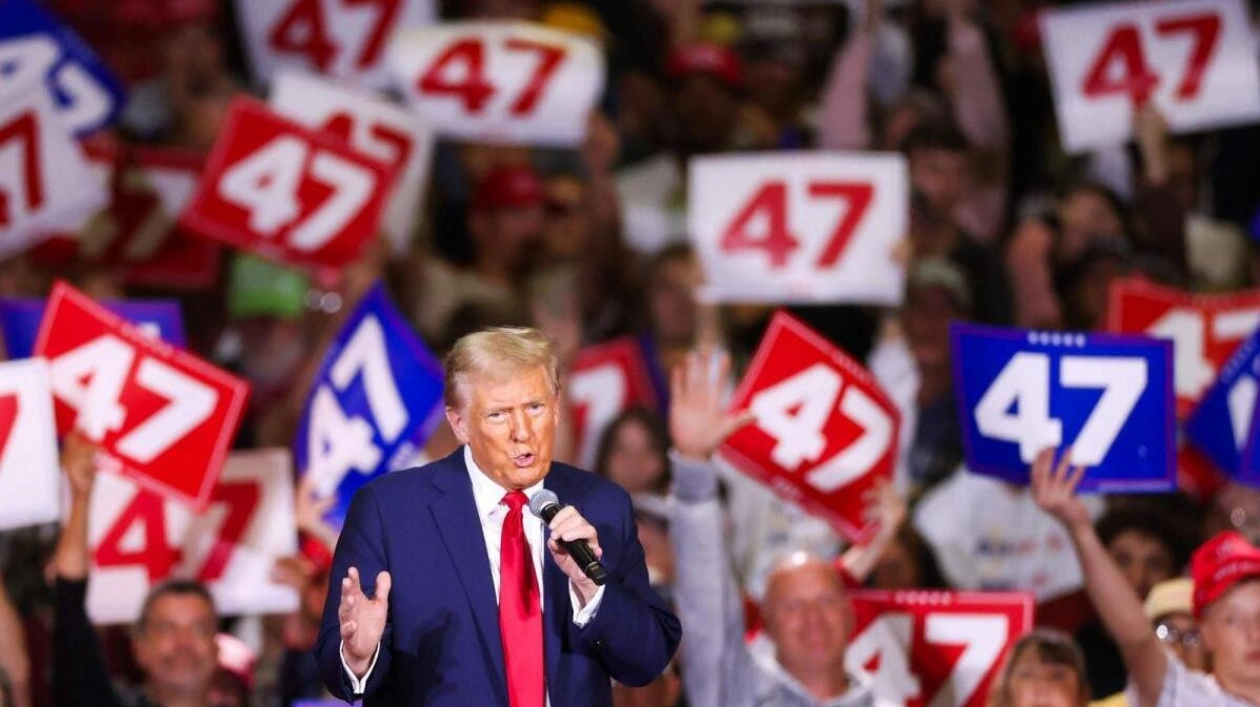Former US president and Republican presidential candidate Donald Trump addresses a town hall at the Convention Centre in Lancaster, Pennsylvania, on October 20. – AFP photo used for illustrative purposes only
"Breaking" news, shouted an online post by a conservative American influencer as he disseminated misinformation about Kamala Harris, highlighting how journalistic terminology has been hijacked to amplify election falsehoods. The misuse of the term, traditionally employed by media outlets to announce significant news developments, is part of an ongoing assault on reality across tech platforms, according to researchers who claim these platforms have loosened their safeguards against false information during a critical election year. This is yet another disinformation trend eroding trust in traditional media—already at historic lows, as surveys indicate—alongside the rise of fake "news" sites and the increasing tactic of attributing false information to legitimate media outlets.
Disinformation peddlers "routinely use terms like 'breaking' in an apparent attempt to lend credibility," Sam Howard, politics editor at the watchdog NewsGuard, told AFP. "This tactic has played a notable role in the false US political narratives that have circulated in 2024." In a recent viral post to his 2.8 million followers on X, the former Twitter, right-wing influencer Benny Johnson wrote: "BREAKING: Univision accidentally broadcast proof that Kamala used a teleprompter at her town hall." He shared a clip of Vice President Harris, the Democratic presidential contender, at the event in Las Vegas, which briefly showed a teleprompter with words on it before it turned off. AFP's fact-checkers debunked the false claim, which spread to other platforms such as Facebook and TikTok; the town hall host confirmed that the teleprompter had only displayed his introduction in Spanish.
"BREAKING: Texas Secretary of State directs poll workers to accept NON CITIZEN driver's licenses as ID to vote," declared another viral post on X debunked by AFP. Federal law prohibits anyone without US citizenship from voting in presidential elections. This month, multiple accounts on X posted the "breaking" news that Jamie Dimon, the influential chief executive of JPMorgan Chase, had endorsed Donald Trump. The Republican nominee also posted a screenshot containing the falsehood on his Truth Social platform. Dimon denied the claim, with his spokesman telling US media the banker had not endorsed any candidate. So far this year, NewsGuard has identified 36 false narratives related to the upcoming election that were promoted by individuals using the term "breaking," Howard said. That is more than a quarter of the total false narratives tracked by the group.
"Journalists report breaking news by interviewing sources, checking data, verifying facts, and updating coverage as needed," said Dan Evon, lead writer with RumorGuard, a site that helps debunk viral disinformation. "On the other hand, charlatans—many of whom claim to be doing citizen journalism—co-opt journalism lingo to push out baseless speculation or fabrications in mere seconds." The nonprofit News Literacy Project, which runs RumorGuard, said it has so far gathered at least 72 examples of social media posts that use mainstream journalism terms such as "breaking," "developing," and "exclusive" as a way to spread false information about the election. The deluge of falsehoods reflects a new normal in the age of information chaos, which researchers say is stoking distrust in the mainstream press. Trust in mass media has reached a "record low," according to a Gallup survey released this month, with only 31 percent of Americans saying they have a "great deal" or "fair amount" of confidence in the press. Further eroding the trust, researchers say hundreds of fake sites masquerading as "news" outlets have proliferated in recent months. The sites—which mimic local news outlets and are largely enabled by cheap, widely available artificial intelligence tools—appear to be fueling an explosion of polarizing or false narratives about the election.
In another troubling trend, online influencers have been attributing false information to credible news outlets. This month, conservative influencers shared a screenshot of a headline attributed to The Atlantic magazine, which suggested Harris may need to "steal" the election to save democracy. AFP's fact-checkers found the headline had been fabricated. RumorGuard's Evon said using journalism terms to crank out falsehoods was a popular tactic but relatively easy to spot and debunk despite the potential to go viral. "Remember to check your sources," he said. "Look for evidence and slow your scroll on social media to allow time for credible information to emerge."
Source link: https://www.khaleejtimes.com






